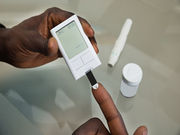Findings in African-American patients with new-onset diabetic ketoacidosis and severe hyperglycemia
FRIDAY, Sept. 2, 2016 (HealthDay News) — For patients with new-onset diabetic ketoacidosis (DKA) and severe hyperglycemia, metformin and sitagliptin treatment after normoglycemia remission correlate with increased relapse-free survival and prolonged remission, according to a study published online Aug. 29 in Diabetes Care.
Priyathama Vellanki, M.D., from the Emory University School of Medicine in Atlanta, and colleagues conducted a prospective four-year study involving 48 African-American subjects with DKA and severe hyperglycemia. Participants were randomized to metformin (17 participants), sitagliptin (16 participants), or placebo (15 participants) after normoglycemia remission. Oral glucose tolerance tests were conducted at randomization, at three months, and every six months for a median of 331 days.
The researchers found that the metformin and sitagliptin groups had significantly higher relapse-free survival compared with placebo (P = 0.015), and significantly prolonged mean time to relapse (480 versus 305 days; P = 0.004). Compared with placebo, the probability of relapse was significantly lower for metformin and sitagliptin (hazard ratios, 0.28 and 0.31, respectively). Compared with those with hyperglycemia relapse, individuals who remained in remission had a higher disposition index and incremental area under the curve for insulin, with no significant changes in insulin sensitivity.
“This study shows that near-normoglycemia remission was similarly prolonged by treatment with sitagliptin and metformin,” the authors write. “The prolongation of remission was due to improvement in β-cell function.”
Several authors disclosed financial ties to pharmaceutical companies, including Merck, which manufactures sitagliptin.
Full Text (subscription or payment may be required)
Copyright © 2016 HealthDay. All rights reserved.








